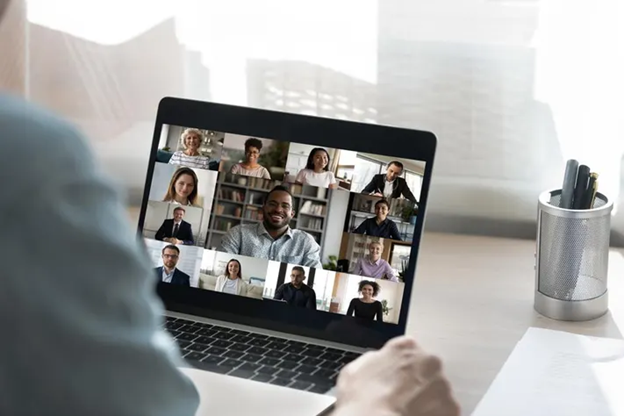Virtual Events and Digital PR: Adapting to the Shift Towards Online Engagement in 2024
The field of public relations (PR) is going through a period of tremendous change as a result of the ongoing development of technology. One of the most significant transformations that has occurred throughout the past few years is the emergence of virtual events as an essential component of digital public relations campaigns. Virtual events are becoming increasingly commonplace across all sectors of the economy in the year 2024, and the trend toward online involvement shows no signs of slowing down.
Within the scope of this article, we will investigate how digital public relations professionals may adjust to the trend towards virtual events and make use of them to improve the visibility of their brands, level of participation, and management of their reputations.
-
The Rise of Virtual Events:
The development in popularity of virtual events may be attributed to several different causes, including the progression of technology, the shifting interests of consumers, and the worldwide trend toward distant work and digital communication. Events data provide chances for participation and connection that are unmatched by any other type of event since they possess the capacity to bring together individuals from all parts of the world without being limited by physical location.
-
Benefits of Virtual Events for Digital PR:

According to Mark McShane, Digital PR Agency Owner of Cupid PR, “The use of virtual events offers a multitude of benefits to digital public relations operations. They make it possible to expand accessibility, making it possible for people from a variety of geographical places to engage regardless of whether or not they have to travel. By eliminating costs associated with venue rents, catering, and travel accommodations, virtual events are frequently more cost-effective than typical in-person events. This is because virtual events do not need attendees to come to the location. Additionally, virtual events provide the ability to collect vital data and insights about participants, including their preferences and the degree of involvement they have throughout the event.”
-
Leveraging Virtual Events for Media Relations:
Shannon Coventry, Marketing Manager at First Vehicle Leasing says, “As efficient methods for media relations, virtual events can be utilized by experts working in digital public relations. Brands can facilitate direct contact with journalists, bloggers, and influencers by conducting virtual press conferences, product launches, or private briefings. The purpose of these events is to give a stage for the presentation of new goods or projects, the dissemination of corporate information, and the acquisition of editorial placements and media attention.”
-
Creating Engaging Virtual Content:
“Digital public relations specialists need to place a strong emphasis on the creation of content that is both interactive and engaging to attract and keep the attention of attendees of virtual events. Live webinars, panel discussions, product demos, and virtual question-and-answer sessions are all examples of this type of event. Companies can improve the entire experience of attendees and make an impression that will stay by providing them with relevant information, encouraging meaningful connections, and including multimedia components such as movies and interactive polls across their presentations” says, Windy Ko, HARO links specialist at HARO Link Building
-
Promoting Virtual Events Across Digital Channels:

“When it comes to increasing attendance and making the most of the impact of virtual events, effective advertising is very necessary. Digital public relations specialists should utilize a thorough multi-channel strategy to effectively communicate with their intended audience. To do this, it may be necessary to make use of social media platforms, email marketing campaigns, influencer relationships, and online advertising to build interest and stimulate registration.” asserts, Billy Webb, Managing Director at vapejuice
-
Enhancing Brand Visibility and Thought Leadership:
“It is possible for businesses to demonstrate their knowledge and thought leadership within their respective sectors by utilizing virtual events, which provides a perfect venue for doing so. Brands have the opportunity to establish themselves as a trusted authority and industry leaders by holding sessions that are both instructive and thought-provoking on issues that are pertinent to their business,” says, Sasha Quail, Business Development Manager of claims.co.uk. They can strengthen their reputation and build trust by carefully curating material that tackles the difficulties and trends that are affecting their audience.
-
Collecting and Analyzing Data:
The vast amount of information that can be obtained from virtual events is one of the reasons why they are so advantageous. Tim Parker, Director at Syntax Integration says, “In the realm of digital public relations, professionals can gather vital information on the demographics of attendees, engagement metrics, and content choices. Companies can acquire useful insights into the efficacy of their virtual events and find areas in which they can improve by analyzing this data. This method, which is powered by data, enables informed decision-making and gives companies the ability to modify future events to better fit the requirements and interests of their audience.”
-
Cultivating Virtual Communities:

“Events that take place online provide guests with the ability to develop communities and foster connections with one another. To enable continued participation and debate, specialists in the field of digital public relations might build specific online forums, networking sessions, or social media groups on the internet. Companies can cultivate a sense of belonging and loyalty among their audience members by offering a platform that offers participants the opportunity to interact with one another, share their views, and exchange ideas.” explains Arman Minas, Director at Armstone
-
Measuring Success and ROI:
It is vital to measure the performance of virtual events to evaluate the impact they have and to determine the return on investment (ROI) of these events. It is important for professionals working in digital public relations to develop crystal-clear goals and key performance indicators (KPIs) to monitor. Some examples of these metrics are the rates of attendance and engagement, the amount of media attention, the number of leads generated, and the number of conversions. Brands can evaluate the efficacy of their virtual events and make decisions based on the data collected to maximize the success of their future efforts if they routinely monitor and analyze these indicators.
-
Adapting to Changing Trends and Technologies:

“As the environment of digital public relations continues to undergo fast change, professionals need to remain current on the latest trends and innovations in the realm of virtual events technology. Experimentation with new platforms, formats, and interactive elements may be necessary to maintain audience engagement and ensure that they are kept informed. In 2024 and beyond, organizations will be able to continue to employ virtual events as a strategic tool for communication, engagement, and brand promotion if they continue to embrace innovation and stay adaptive” says, Gerrid Smith, Chief Marketing Officer at Joy Organics
Conclusion:
Within the context of a world that is becoming increasingly digital, virtual events have emerged as an essential component of digital public relations strategy. These events provide chances for engagement, connection, and brand growth that are unmatched. Increasing the exposure of their brands, cultivating genuine connections with their audience, and driving concrete outcomes for their companies are all things that digital public relations professionals can do by properly exploiting virtual events. The full potential of virtual events can be used by companies to fulfill their communication goals and enhance their position in the digital world. This can be accomplished via the production of content that is engaging, smart promotion, data-driven analysis, and continual adaptability to shifting trends and technology.




